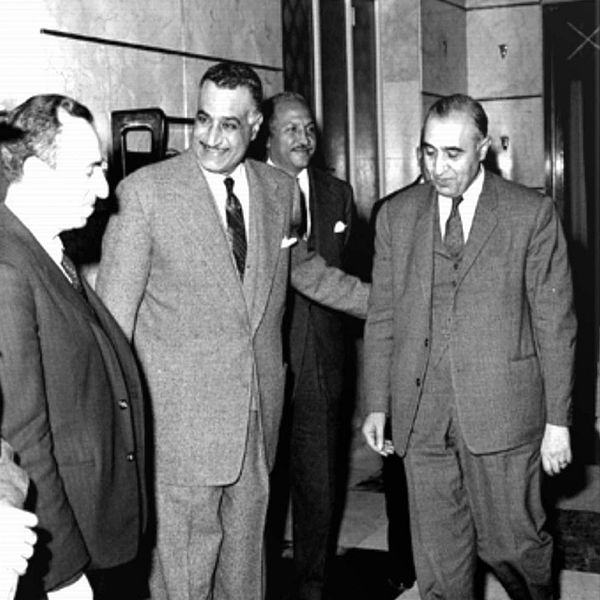Salah al-Din al-Bitar was a Syrian politician who co-founded the Arab Baʿth Party with Michel Aflaq in the early 1940s. As students in Paris in the early 1930s, the two formulated a doctrine that combined aspects of nationalism and socialism. Bitar later served as prime minister in several early Ba'athist governments in Syria but became alienated from the party as it grew more radical. In 1966 he fled the country, lived mostly in Europe and remained politically active until he was assassinated in Paris in 1980 by unidentified hitmen linked to the regime of Hafez al-Assad.

Nasser at the gates of the Presidential Palace in Damascus in 1958. Nasser was standing with Syrian and Egyptian cabinet members of the UAR. From left to right; Vice President Hawrani, Abd al-Latif al-Baghdadi, a vice president, followed by Nasser, Marshal Abd al-Hakim Amer, who became Governor of Syria, and Sabri al-Asali, a vice president. Then stands Fakhir al-Kayyali, the Minister of Economy. Standing to the far right is Bitar. In the middle row, second from left, is
A meeting between the Syrian and Egyptian delegations. From left to right: Prime Minister Bitar, head of state Atassi, Egyptian President Nasser, and Aflaq, the Ba'ath Party leader
Hafiz at Cairo Airport in August 1963 being greeted by Nasser. Bitar is standing to the far right
The Arab Socialist Baʿth Party was a political party founded in Syria by Mishel ʿAflaq, Ṣalāḥ al-Dīn al-Bīṭār, and associates of Zakī al-ʾArsūzī. The party espoused Baʿathism, which is an ideology mixing Arab nationalist, pan-Arab, Arab socialist, and anti-imperialist interests. Baʿthism calls for the unification of the Arab world into a single state. Its motto, "Unity, Liberty, Socialism", refers to Arab unity, and freedom from non-Arab control and interference.
Michel Aflaq (left) and Salah al-Din Bitar (right) with Egyptian President Gamal Abdel Nasser (centre) in 1958. The three leaders were prime advocates for a pan-Arab union
Part of the 1947 Ba'ath Party constitution
Akram al-Hawrani (left) with Michel Aflaq, 1957.






